Catholic Theology and Dogma Collection (7 vols.)
Digital Logos Edition
Overview
The 7-volume Catholic Theology and Dogma Collection provides the basic tenets of Catholic theology, dogma, and practice. With titles by Henry Denzinger and Sylvester Joseph Hunter, these volumes have helped define dogma during times of dissension, providing necessary teaching to articulate Catholic theology. From Trent to the First Vatican Council, the decisions and decrees outlines in these documents are still useful for faith and practice in the church today. This collection is essential for scholars, laypersons, and both Catholics and Protestants seeking to understand the history and theology of the Roman Catholic Church.
What’s more, with the Logos Bible Software edition, these important Catholic works are more accessible than ever! With Logos, every word is essentially a link! Scripture references are linked directly to the Bibles in your library—both the original language texts and English translations. Double-clicking any word automatically opens your lexicons to the relevant entry, making Latin words instantly accessible. With Logos, you can quickly move from the table of contents to your desired content, search entire volumes and collections by topic, title, or Scripture reference.
- Essential works of Catholic theology and dogma in the English language
- Logos editions allow for quick and easy document navigation
- All Scripture passages are displayed on mouseover and are linked directly to original language texts and English translations
- Title: Catholic Theology and Dogma Collection
- Volumes: 7
- Pages: 3,368
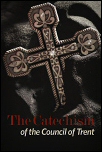
Previously called the Roman Catechism, The Catechism of the Council of Trent is considered by many to be the most important Catholic catechism. Although originally designed as a resource for parish priests to provide instruction, it is now used extensively by laypeople as a source of core Catholic theology. It contains the basic tenets of the Catholic faith, providing clear explanations of what is necessary for salvation. It also includes material on the Ten Commandments, the Apostles Creed, the Sacraments, and more.
The Council of Trent commissioned the first Church-wide catechism, finished in 1564. The Council dealt with the growing concern in the Church over the Protestant Reformation, and recognized the need for a document to teach the basics of the Catholic faith. The first English translation of the catechism was completed in 1839.
Every Catholic home should have this important catechism about the Holy Catholic Faith as it was reaffirmed by the present Holy Father, Benedict XVI, to be ‘an important Catholic catechism.’
—Online reviewer
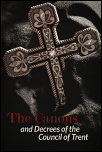
The Council of Trent convened in response to the teaching and rapid spread of the Protestant Reformation. In fact, its primary intent was to condemn and refute every Reformed doctrine. The Council issued numerous decrees and formal statements of Catholic doctrine on topics of salvation, the sacraments, and the canon. This council met for twenty five sessions from 1545 to 1563. The decrees issued at Trent have never been overturned and many were reaffirmed again at the Second Vatican Council during the 1960s.
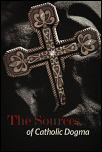
The Sources of Catholic Dogma
- Author: Henry Denzinger
- Publisher: B. Herder Book Co.
- Publication Date: 1957
- Pages: 715
Denzinger’s collection of articles of faith and morality for the Catholic Church is widely used as a comprehensive reference book. Presented in a practical and accessible manner, it includes dogmatic definitions, creeds of the faith, and decrees of Church leadership. Since its first printing a century and a half ago, this book has received accolades and wide appeal among Catholic scholarly works. First published in 1854 as Enchiridion Symbolorum et Definitionum, Denzinger’s Sources of Catholic Dogma is among the most important works of dogmatic theology in print today.
This book should be on the shelves of every English-speaking Catholic, beside a copy of The Haydock Bible (The Douay-Rheims Old and New Testament) and Fundamentals of Catholic Dogma. The Bible is the only perfect book but these books will provide a lifetime of contemplation of ‘those mysteries of faith which must be known and believed in order to be numbered among the elect’ (Pope Pius X, Acerbo Nimis, 2).
—Mark Michael Zima, author, Mother Teresa: The Case for The Cause
Heinrich Joseph Dominicus Denzinger (1819–1883) was a prominent Catholic theologian. He studied at Würzburg, where he received his PhD, and also studied in Rome. He was ordained in 1844 and became professor of Dogmatic theology at Würzburg in 1848.
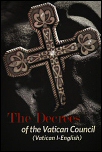
The First Vatican Council was the twentieth ecumenical council of the Roman Catholic Church, which met three hundred years after the Council of Trent. It was convened in order to refute modern theological differences and to define Catholic doctrine in response to the rise of modernism. The First Vatican Council approved two constitutions: one on the Dogmatic Constitution of the Catholic Faith, and the other—famously—on papal infallibility. The council also clarified the role of the pope in the Roman Catholic Church.
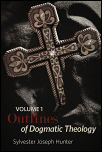
Sylvester Joseph Hunter’s famous 3-volume Outlines of Dogmatic Theology presents a complete course in dogmatic theology. First written to train priests for ministry—yet written in a manner accessible to the laity—this volume offers an accessible, readable, and informative introduction to Catholic dogma. Hunter ties together the various traditions and streams of theological discourse to provide a framework for understanding the church’s theology and dogma.
The first volume of Hunter’s Outlines of Dogmatic Theology defines and defends Christian revelation as a legitimate source of knowledge—as it is found both in the words of Scripture and in the tradition of the Church. This volume also contains lengthy expositions on the meanings of faith, the Church, and the pope.
Sylvester Joseph Hunter (1829–1896) was born in Bath and his family moved to London shortly thereafter. He attended St. Paul’s School before enrolling at Trinity College, Cambridge. He graduated in 1852 and began practicing law, publishing two legal textbooks. In 1857, Hunter converted to Catholicism, following his two sisters into the church. He entered the Society of Jesus in 1861 and was ordained as a priest in 1870. Hunter quickly became a respected writer and scholar, earning a teaching post at Stonyhurst College. He also began training Jesuit priests in 1875, and was appointed as rector of St. Beuno’s College. Sylvester Joseph Hunter died only two years after the first edition of his 3-volume Outlines of Dogmatic Theology was published.
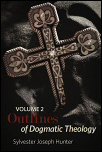
In the second volume of his Outlines of Dogmatic Theology, Hunter includes treatises on the knowledge and existence of God—including the philosophical proofs of God’s existence. He also writes at length on the Trinity.
The second half of this volume contains lengthy treatises on creation and angels, in which Hunter discusses the distinction between the material and spiritual world, drawing heavily from both Scripture and the tradition of the Church. He also writes on Christ’s incarnation and redemptive work, outlining the key moments in Christ’s life—baptism, transfiguration, and resurrection—and their theological and historical implications.
Sylvester Joseph Hunter (1829–1896) was born in Bath and his family moved to London shortly thereafter. He attended St. Paul’s School before enrolling at Trinity College, Cambridge. He graduated in 1852 and began practicing law, publishing two legal textbooks. In 1857, Hunter converted to Catholicism, following his two sisters into the church. He entered the Society of Jesus in 1861 and was ordained as a priest in 1870. Hunter quickly became a respected writer and scholar, earning a teaching post at Stonyhurst College. He also began training Jesuit priests in 1875, and was appointed as rector of St. Beuno’s College. Sylvester Joseph Hunter died only two years after the first edition of his 3-volume Outlines of Dogmatic Theology was published.
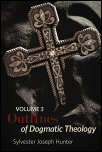
In the final volume of Outlines of Dogmatic Theology, Hunter covers the nature and necessity of grace, and the interplay between grace and free will. This volume also includes a treatise on the doctrine of justification—one of the most important and divisive doctrines of the Protestant Reformation. He compares justification as it is understood from various theological viewpoints, including Catholic, Lutheran, and Calvinist. This volume concludes with treatises on the sacraments—including detailed exposition of each Roman Catholic sacrament—and a treatise on eschatology.
Sylvester Joseph Hunter (1829–1896) was born in Bath and his family moved to London shortly thereafter. He attended St. Paul’s School before enrolling at Trinity College, Cambridge. He graduated in 1852 and began practicing law, publishing two legal textbooks. In 1857, Hunter converted to Catholicism, following his two sisters into the church. He entered the Society of Jesus in 1861 and was ordained as a priest in 1870. Hunter quickly became a respected writer and scholar, earning a teaching post at Stonyhurst College. He also began training Jesuit priests in 1875, and was appointed as rector of St. Beuno’s College. Sylvester Joseph Hunter died only two years after the first edition of his 3-volume Outlines of Dogmatic Theology was published.
Reviews
3 ratings

Larry Craig
11/15/2018
I could be interested in this. The three volumes of Dogmatic Theology show sample pages only of its table of contents. That's not helpful in a book like this. You need to show what is being said about these things.
REV. DR. JAIME LOPEZ ORTEGA
3/1/2018
Please do not be so ignorant ...Nor pretend to be... your outlines in dogmatic theology is not I repeat is not 3 volumes... it is 3 books in one volume...one stand alone book is a volume but three books combined between a front and back cover is not nor can be 3 volumes... it is called 3 stand alone books or three books in one volume... it is also not funny when your ignorant staff can be heard laughing at who they think is the ignorant one.. please raise your standards for staff... you're an embarrassment at this point... Thank you..Michael T. Fox
1/20/2017
Robert Leahy
5/28/2014

Gregory S. MacBeth
8/8/2013